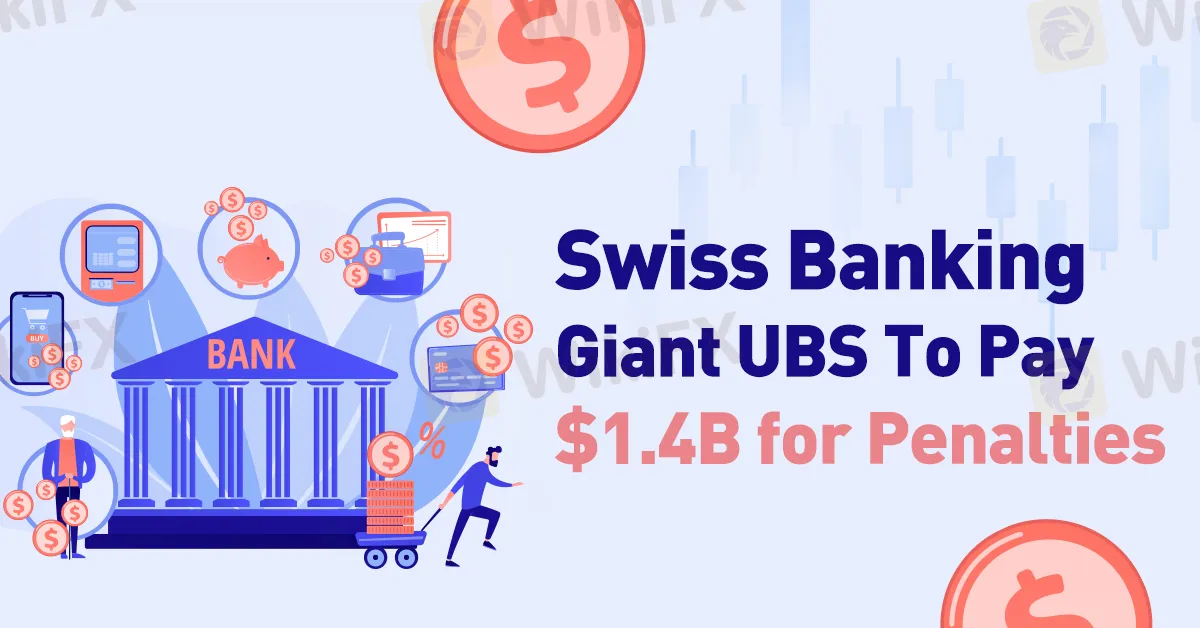简体中文
繁體中文
English
Pусский
日本語
ภาษาไทย
Tiếng Việt
Bahasa Indonesia
Español
हिन्दी
Filippiiniläinen
Français
Deutsch
Português
Türkçe
한국어
العربية
Swiss Banking Giant UBS To Pay $1.4B for Penalties
Abstract:UBS agrees to pay $1.44 billion in fines for alleged fraud in sale of mortgage-backed securities.

UBS, the prominent Swiss banking behemoth, has concurred to disburse a staggering $1.44 billion in fines to resolve allegations of fraud. The accusations pertain to the bank's purported misleading of investors in the United States through selling residential mortgage-backed securities (RMBS) in the lead-up to the tumultuous 2008 financial crisis. This significant development was officially communicated today (Monday) by the United States Department of Justice (DOJ).
Emerging from a legal entanglement initiated several years ago, the law enforcement agency had lodged claims that UBS engaged in fraudulent activities by providing false and deceptive information concerning 40 RMBS issued in 2006 and 2007. The crux of the allegations revolved around UBS's purported knowledge, as they had purportedly carried out exhaustive due diligence on the underlying loans before the issuance of the RMBS. This diligence was ostensibly conducted to ascertain the alignment of the loans with the representations intended for investors. Regrettably, the outcome saw the aforementioned 40 RMBS incurring substantial financial losses.

Furthermore, the agency emphasized that this settlement culminates the final case pursued by its dedicated task forces, which were established to scrutinize the actions of financial institutions and other pertinent actors during the financial crisis.
It is worth noting that before this resolution, the DOJ had secured agreements to settle akin allegations of fraud against other significant financial entities such as Nomura Holdings, the Royal Bank of Scotland (RBS), Merrill Lynch, and Barclays. Consequently, in conjunction with the fresh accord reached with UBS, the collective tally of penalties imposed on banks, loan originators, and rating agencies ensnared within the ambit of the DOJ's investigation has now surpassed a formidable $36 billion, as iterated by the justice department.
Nevertheless, the agency underscored that the allegations resolved through the settlement with UBS remain just allegations. This stipulation implies that UBS has not admitted to any wrongdoing. In tandem, UBS validated the settlement in an issued statement, revealing that the financial provision for this settlement had been accounted for in the preceding periods.
“The substantial civil penalty, in this case, serves as a warning to other players in the financial markets who seek to unlawfully profit through fraud that we will hold them accountable no matter how long it takes,” declared Breon Peace, the US Attorney for the Eastern District of New York, accentuating the significance of the agreement.
He underscored the DOJ's unwavering dedication to safeguarding financial markets, investors, and the general public against deceitful practices. The amassed sum of over $36 billion, designated for behaviours that exacerbated the 2008 financial crisis, is a poignant testament to the Department of Justice's steadfast commitment, added Peace.

Disclaimer:
The views in this article only represent the author's personal views, and do not constitute investment advice on this platform. This platform does not guarantee the accuracy, completeness and timeliness of the information in the article, and will not be liable for any loss caused by the use of or reliance on the information in the article.
Read more

5 Overlooked Details That Could Make or Break Your Trades
Trading requires more than just a solid strategy. Success often depends on paying attention to small details. These details may seem unimportant but can have a big impact. Many traders ignore them, only to realise their importance later.

Forex Trends: What the Chinese Zodiac Says About the Lunar New Year Market Movements
The Lunar New Year, a celebration rich with tradition, culture, and symbolism, marks the beginning of a new year in the Chinese calendar. Beyond the vibrant parades and festivities, the occasion holds significant meaning in various sectors, including the financial markets.

Can You Really Trust Offshore Brokers?
Offshore brokers have become a popular choice for traders around the world. They often promise low fees, high leverage, and access to global markets. Many traders see these benefits and decide to open accounts. But the big question remains: Can offshore brokers be trusted?

Italy’s CONSOB Orders Blockage of Five Unauthorized Investment Websites
Italy’s Companies and Exchange Commission (CONSOB) has issued a fresh round of orders to block access to five unauthorized financial service websites operating without proper licenses.
WikiFX Broker
Latest News
NBI Busts Crypto and Phishing Scam Operation in Parañaque City
Doo Prime Officially Launches Trading for OFFICIAL TRUMP (TRUMP/UST)
Acuity Trading Integrates Its Cutting-Edge Tools with cTrader to Revolutionize Trading Experiences
Khazanah Nasional Bets on Developed Markets Amid Global Shifts
Phemex Hacked: $37 Million Loss Raises Crypto Security Concerns
Trump Urges OPEC to Lower Oil Prices
British Museum hit by alleged IT attack by ex-worker
Japan May Face Significant Interest Rate Hikes
Philippines Launches 10-Year & 25-Year USD Global Bonds
Binance Kicks Off 'It's Still Early for Crypto' Campaign
Currency Calculator


